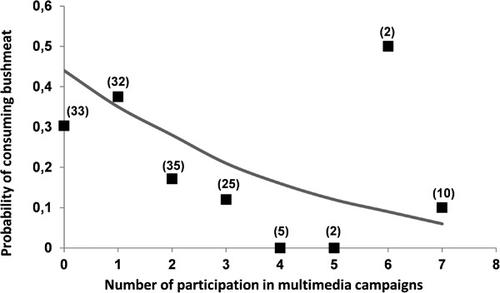当前位置:
X-MOL 学术
›
Am. J. Primatol.
›
论文详情
Our official English website, www.x-mol.net, welcomes your feedback! (Note: you will need to create a separate account there.)
Lessons learned while protecting wild chimpanzees in West Africa
American Journal of Primatology ( IF 2.4 ) Pub Date : 2020-10-27 , DOI: 10.1002/ajp.23209 Christophe Boesch 1 , Arnaud Gotanegre 2 , Annika Hillers 3 , Joseph Kouassi 4 , Hedwige Boesch 1 , Pacifique Kizila 2 , Emmanuelle Normand 4
American Journal of Primatology ( IF 2.4 ) Pub Date : 2020-10-27 , DOI: 10.1002/ajp.23209 Christophe Boesch 1 , Arnaud Gotanegre 2 , Annika Hillers 3 , Joseph Kouassi 4 , Hedwige Boesch 1 , Pacifique Kizila 2 , Emmanuelle Normand 4
Affiliation

|
Though human activities are postulated to be the main drivers of the worldwide biodiversity crisis, humans are also suggested by some to be an important part of the solution to the crisis. How can such a paradox be best solved? This paradox requires an adaptive, context‐specific, dynamic solution, at a fine‐grained scale that varies by location. The Wild Chimpanzee Foundation (WCF) works on the ground in three West African countries: In Côte d'Ivoire, where bushmeat consumption is a recurrent and generalized threat to wildlife, WCF used live theater performances in the villages to address this issue. Post‐activity evaluations revealed that the more often individuals have been part of such awareness activities, the less they will consume bushmeat. In nearby Liberia, where illegal miners have invaded many protected areas and intact forests, the WCF supports Community Watch Teams (CWT) to patrol the Sapo National Park with Forestry Development Authority staff. Within 11 months of its creation, the CWT patrols around and in the Sapo National Park resulted in thousands of illegal miners progressively leaving the national park. In Guinea, where coexistence between humans and primates has prevailed based on religious traditions, the WCF developed a strategic approach, as the Moyen‐Bafing National Park contains about 5000 chimpanzees as well as some 255 villages. Therefore, we adopted an “integrated landscape approach” whereby the community activities are planned in combination with initiatives increasing forest regeneration and connectivity in high conservation value areas. Communities in northern Guinea confronted with dramatic fluctuations due to climatic changes welcomed such activities that help them become more resilient and adaptable to those alterations. In conclusion, evidence‐based information at the local level helps to resolve the conservation paradox by adapting with the local communities' context‐specific dynamic approaches to enhance the conservation of great apes.
中文翻译:

保护西非野生黑猩猩的经验教训
尽管人类活动被认为是全球生物多样性危机的主要驱动因素,但一些人也建议人类是解决危机的重要组成部分。如何最好地解决这样的悖论?这个悖论需要一个自适应的、特定于上下文的、动态的解决方案,在一个因位置而异的细粒度尺度上。野生黑猩猩基金会 (WCF) 在三个西非国家开展实地工作:在科特迪瓦,食用丛林肉是对野生动物的经常性和普遍威胁,WCF 在村庄使用现场戏剧表演来解决这个问题。活动后评估显示,个人参与此类意识活动的次数越多,他们食用丛林肉的次数就越少。在附近的利比里亚,非法采矿者侵入了许多保护区和完整的森林,WCF 支持社区观察队 (CWT) 与林业发展局的工作人员一起在 Sapo 国家公园巡逻。在成立后的 11 个月内,CWT 在 Sapo 国家公园周围和内部巡逻,导致数千名非法矿工逐渐离开国家公园。在几内亚,根据宗教传统,人类和灵长类动物共存盛行,WCF 制定了一项战略方法,因为 Moyen-Bafing 国家公园包含大约 5000 只黑猩猩和大约 255 个村庄。因此,我们采用了“综合景观方法”,将社区活动与促进高保护价值地区森林再生和连通性的举措相结合。由于气候变化而面临剧烈波动的几内亚北部社区欢迎此类活动,以帮助他们变得更有弹性和适应这些变化。总之,地方层面的循证信息有助于通过适应当地社区特定于环境的动态方法来加强类人猿保护,从而解决保护悖论。
更新日期:2020-10-29
中文翻译:

保护西非野生黑猩猩的经验教训
尽管人类活动被认为是全球生物多样性危机的主要驱动因素,但一些人也建议人类是解决危机的重要组成部分。如何最好地解决这样的悖论?这个悖论需要一个自适应的、特定于上下文的、动态的解决方案,在一个因位置而异的细粒度尺度上。野生黑猩猩基金会 (WCF) 在三个西非国家开展实地工作:在科特迪瓦,食用丛林肉是对野生动物的经常性和普遍威胁,WCF 在村庄使用现场戏剧表演来解决这个问题。活动后评估显示,个人参与此类意识活动的次数越多,他们食用丛林肉的次数就越少。在附近的利比里亚,非法采矿者侵入了许多保护区和完整的森林,WCF 支持社区观察队 (CWT) 与林业发展局的工作人员一起在 Sapo 国家公园巡逻。在成立后的 11 个月内,CWT 在 Sapo 国家公园周围和内部巡逻,导致数千名非法矿工逐渐离开国家公园。在几内亚,根据宗教传统,人类和灵长类动物共存盛行,WCF 制定了一项战略方法,因为 Moyen-Bafing 国家公园包含大约 5000 只黑猩猩和大约 255 个村庄。因此,我们采用了“综合景观方法”,将社区活动与促进高保护价值地区森林再生和连通性的举措相结合。由于气候变化而面临剧烈波动的几内亚北部社区欢迎此类活动,以帮助他们变得更有弹性和适应这些变化。总之,地方层面的循证信息有助于通过适应当地社区特定于环境的动态方法来加强类人猿保护,从而解决保护悖论。


























 京公网安备 11010802027423号
京公网安备 11010802027423号